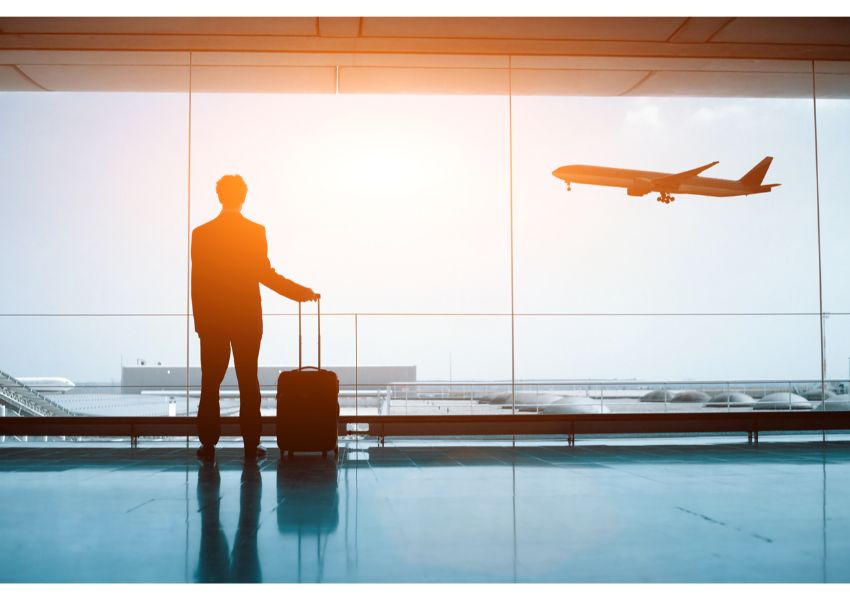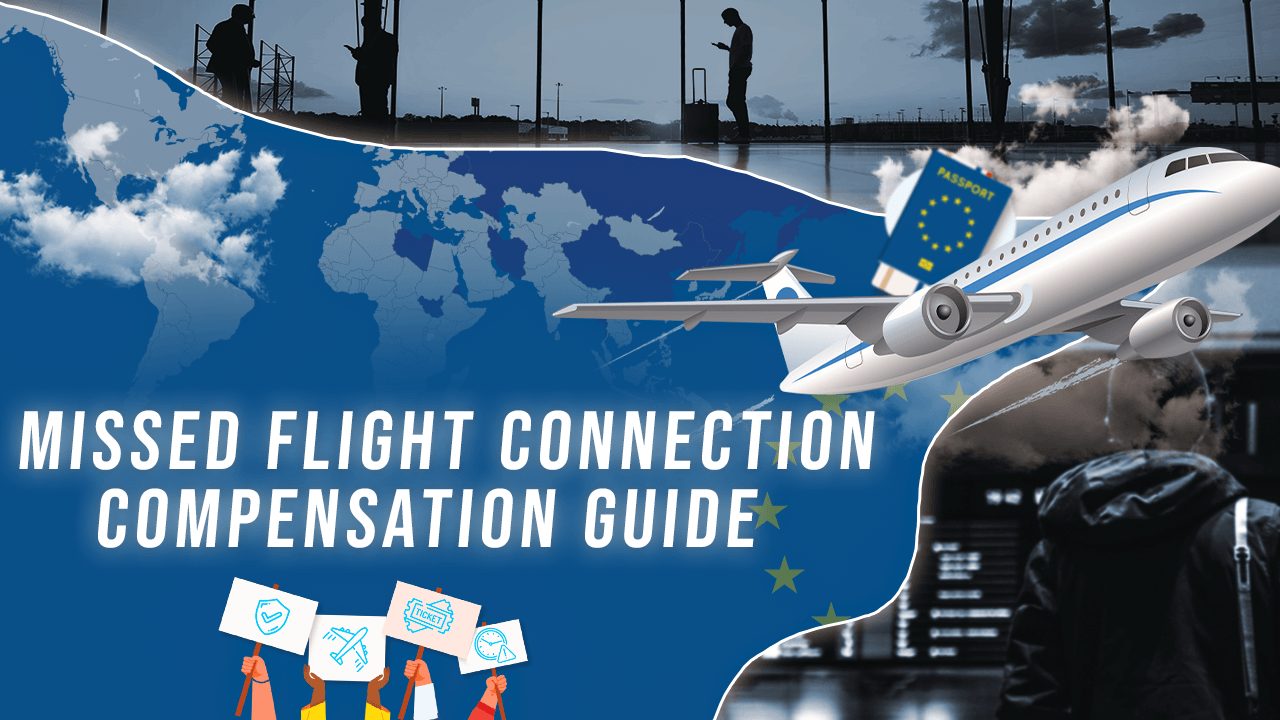When you’ve perfectly planned your itinerary, a missed connection can derail everything. You’ll get to your destination much later than anticipated, maybe even paying for expenses you hadn’t budgeted for. This doesn’t have to set the tone for your trip, and if it happens, you may be eligible for additional compensation. In this missed flight connection compensation guide, we will explore the steps you can take to navigate the aftermath of a missed flight connection and ensure you understand your rights as a passenger. From understanding airline policies to filing a claim for compensation, we’ll provide you with the essential information you need to turn a frustrating situation into a potentially rewarding one. Let’s dive in and learn how to make the most out of your missed connection and get the compensation you deserve. Information in this article was updated in 2026.
Key Takeaways
- EU Regulation EC 261/2004 protects passengers who miss a flight connection due to airline errors. It is crucial for all segments of the journey to be booked under the same reservation for this protection to apply.
- Passengers may claim compensation under EC 261 if they arrive at their final destination 3 hours or more later than scheduled due to a missed connection caused by the airline. The compensation value, which can go up to £540, depends on the total delay and the total length of the journey, not just the missed segment.
- In addition to compensation, passengers are entitled to meals, refreshments, and accommodation (if an overnight delay is involved) while waiting for their rescheduled flight. Airlines are obliged to provide these services as part of their ‘right to care’ obligation.
- Depending on the circumstances, passengers could be eligible for additional rights like a full or partial refund if the delay exceeds five hours, and upgrading or downgrading of seats without extra charge. If passengers are downgraded, they can claim a refund of 30 to 75% of the original fare.
- Passengers can file a compensation claim themselves by gathering all necessary documentation and submitting it to the airline. Alternatively, they can work with specialized flight compensation companies. These companies work on a contingency basis, taking a portion of the compensation as their fee. However, they have experts who understand flight law and can improve the chances of a successful claim.
Missed Connecting Flight Compensation Overview

Not all destinations are accessible with a direct flight – though it would be nice if they were! Sometimes, to get to where you need to go, you have to take multiple flights. That’s what’s called a connecting flight or a layover. You booked a single reservation, but you may have multiple stopping points under that reservation. These layovers connect via additional airports and cities. For example, you may be flying from Vienna to Brussels, but you have a stop in Amsterdam. Your Amsterdam flight is essential to get you to Brussels, but because of a delay, you missed it. What happens now?
You still work directly with the airline to get on the next available flight. If your delay is significant, you may qualify for additional care, including meals, accommodation, communication, and transportation. However, once you reach your final destination, you can file for additional compensation if you did not waive your rights. As long as the delay was the fault of the airline, then you can file for compensation under EC 261. While missed flight connections aren’t specifically covered, they are if they result from a flight delay, cancelation, or involuntarily denied boarding. You couldn’t make your connecting flight because of an issue with your main flight, so the law protects your rights.
Not all flights are eligible for missed connection compensation, so it’s important to understand your rights. That way, you know what to expect when you file a claim under EC261/2004.
What Flights are Eligible?
EC 261 only covers flights in Europe, but even within that, there are some exclusions.
| Itinerary | EU air carrier | Non-EU air carrier |
|---|---|---|
| From inside the EU to inside the EU | ✔️ Yes | ✔️ Yes |
| From inside the EU to outside the EU | ✔️ Yes | ✔️ Yes |
| From outside the EU to inside the EU | ✔️ Yes | No - unless your journey originated in EU* |
| From outside the EU to outside the EU | No - unless your journey originated in EU* | No - unless your journey originated in EU* |
Your itinerary isn’t the only thing that matters when it comes to filing a claim under EC 261 for your missed connection. There are other qualifying circumstances, like:
- Your connecting flights were part of the same booking. They do not apply if you purchased each flight separately.
- You missed your connection because your flight was delayed, canceled, or overbooked.
- If you rebooked your connecting flight, you arrived at your final destination at least three hours or more late.
- Your issue was less than three years old, though some countries have different grace periods that you can file a claim.
The reason behind what caused your original issue matters too. To qualify for additional flight compensation, it has to be something within the airline’s control. This includes airline strikes, overbooking, poor planning, and more. If it is extraordinary circumstances, you will not be able to file unless the airline didn’t do everything in their control to avoid the issue. If you caused the initial issue by being disruptive or late, it would not be covered.
You don’t have to be a European citizen to qualify for a claim under EC 261. You just have to be traveling through EU countries or qualifying airspace. If you’re not, there may be other regulations you can file a claim under, so make sure to read up on your rights when you travel!
How to Tell if Your Connecting Flights Are Part of the Same Reservation?
Connecting flights can be a headache, so make sure you only book them under the same reservation. That way, the airline can help you if something goes wrong and you need to take a new flight. If you book them independently, you may save some money; however, you’ll end up paying for it in the long run if everything doesn’t go perfectly according to plan.
So, how do you tell if your connecting flight is part of the same reservation? You should have everything under the same reservation. When you check your email confirmation, you find all your travel details and itineraries listed in the same email. Most often, you’ll be flying all your legs within the same airline, though there are sometimes exceptions to this rule. If you booked your own flight and you didn’t personally seek out additional flights to get you to your final destination, then you should be in the clear.
If you worked with a travel agent, check with them to be sure. They should notify you if they booked separately, but it never hurts to check to make sure. Your ticket would say self-transfer or something similar if you booked on separate reservations.
Business Travellers
If you travel a lot for business, missed connections are nothing new for you. Often, your company will want to book you on the cheapest flight, and that’s typically one with a stop or two. If any leg of your journey is delayed or canceled, you’re ready to wait it out. However, even if you didn’t pay for the flight yourself, you can still claim compensation. EC 261 doesn’t specify that the person or entity who paid for the ticket is the one who needs to file. Instead, it protects passengers. Whatever the reason you’re flying, if you face a missed connection, you may be eligible for compensation.
What Missed Connections Are Covered?
EC 261 doesn’t specifically call out missed connections in the regulation, but that doesn’t mean they aren’t covered. Instead, they qualify because they’re the result of issues that are covered – namely, flight delays, cancelations, and denied boarding. If you miss your connecting flight for any of these reasons, then you are eligible to file a claim.
Airline Delays
Airlines have much more control than they’d like to let on, which is why EC 261 exists. It strives to hold airlines accountable for their poor practices that lead to costly inconveniences for passengers. The top three reasons people file a claim under EC 261 are:
- A delay that lasts at least three hours, causing your arrival at your destination to be late.
- Canceled flights with less than 14 days’ notice.
- Involuntary denied boarding, most often due to overbooking.
These circumstances apply whether you have a direct flight or a connecting flight, though they can be more inconvenient if they cause you to miss your connection. The most important thing to remember is that the airline must be at fault for these issues. They must be under their control to qualify for compensation under EC 261. If they are not, you will not receive any compensation for your missed connection.
3-hour Delays
Typically, the length of your delay holds a lot of weight under EC 261. Your right to compensation starts kicking in at 3 hours, and that’s also true of missed connection claims. However, the length that you’re waiting for is a little less important. In this case, it’s all about how long of a delay you face when it comes to getting to your final destination.
As you work with the airline’s customer service team, perhaps the next connecting flight is in one hour. That’s great! But if it still gets you to your final destination 3 hours later than you originally planned, you can get compensation. If it’s longer than 3 hours, the amount of compensation will increase up to £540. While it’s never fun to be delayed, there is some peace of mind knowing that you can recoup some of your losses under EC 261 when you miss your connection.
What Missed Connections Are Not Covered?
There are some circumstances under which your missed connection will not be covered, even if you file within the allotted time frame. These include extraordinary circumstances and personal reasons. To qualify for compensation under EC 261, the circumstances that caused the delay need to be within the airline’s control.
Extraordinary Circumstance
Extraordinary circumstances are anything that is out of the airline’s control, though these are reviewed on a regular basis to ensure they still qualify. For example, if there is an airport strike, it will not qualify; however, if it is an airline strike, it will. There are small distinctions, but if it’s anything like extreme weather or political unrest that makes your plane unable to board, take off, or land, you will not be covered.
There are some exceptions. If these issues could have been anticipated, the airline should have taken all reasonable measures to avoid them. Like, if they knew there was a terrible storm front rolling in, they could have taken measures to plan accordingly.
Personal Reasons
Personal reasons are another way that you’ll be disqualified from receiving compensation, so make sure to leave enough time to get through security and the airport to get to your gate in time. Additionally, it is your responsibility to bring all of your necessary documentation, including your identification, boarding pass, and more. If you don’t have proper identification, they may not let you board.
Additionally, if you have caused a safety or security issue, you may also be denied boarding, which can cause you to miss your connecting flight. If the issue is within your control, you’re liable. Airlines may still work with you, depending on the circumstances.
What Compensation Can I Get for Missed Connecting Flights?
The amount of your compensation for your missed connection is similar to that of a flight delay. If your flight delay – that is, the delay to your final destination – is less than 3 hours, then you are not eligible to claim anything under EC 261. The amount of your physical delay between your flights is less important in the case of missed connections. It’s how long it takes to get you where you need to be. Once your flight starts to exceed 3 hours – even if it never arrived – you are eligible to claim flight compensation under EC 261.
| Distance | Less than 3 hours | 3 – 4 hours | More than 4 hours | Never arrived |
|---|---|---|---|---|
| All flights 1500 km or less | € - | ✔️ €250 | ✔️ €250 | ✔️ €250 |
| Internal EU flights over 1500 km | € - | ✔️ €400 | ✔️ €400 | ✔️ €400 |
| Non-internal EU flights between 1500 km and 3500 km | € - | ✔️ €400 | ✔️ €400 | ✔️ €400 |
| Non-internal EU flights over 3500 km | € - | ✔️ €300 | ✔️ €600 | ✔️ €600 |
You can calculate your flight distance bellow.
Now, if you are delayed because of a canceled flight or denied boarding, you may be eligible for additional compensation, though you cannot exceed more than £540 under EC 261. When you’re thinking about how long your flight is for a missed connection claim, you need to consider your journey’s total length. It doesn’t apply just to the part you missed. Instead, it’s the entire trip.
Even if just one part is delayed, the airline is responsible for all aspects of your travel, which is why it’s essential that your connections be booked on the same reservation. There are ripple effects that a single cancelation or delay can cause long after the initial issue. This is why the EU banded together to create EC 261 to hold airlines accountable and promote smooth, functional airline travel regardless of which carrier you’re flying with.
Have you missed connecting flight?
Don’t let missed connecting flight issues cost you – get compensated up to £540!
What Are My Rights for Missed Connecting Flights?
One of your most important rights under EC 261 is the right to compensation if you face a delay, cancelation, or denied boarding that makes you miss your connecting flight. However, you do have other rights under EC 261 that you can take advantage of. EC 261 strives to take care of all passenger rights, and that includes your right to reimbursement and rerouting, right to care, upgrading and downgrading, further compensation, notification, and more.
Right to Reimbursement/Rerouting
If you’ve missed your connecting flight, you want to work directly with the airline. They can help you get booked on the next available flight to help you get to your final destination. However, if the flight or your delay to your final destination exceeds five hours, then you are entitled to a full or partial refund, depending on the leg of your journey that you’re on.
If you do not wish to continue your trip, you are also eligible to get a return flight back to your point of departure. If you accept this, you may be eligible for compensation, especially if you are delayed more than 3 hours.
Right to Care
As you wait, you have the right to receive care and the amount of which depends on how long your delay is. At a minimum, you must have access to communications if yours is unavailable. This includes phone calls, emails, faxes, and more. If your delay is over a traditional meal time, you should also be provided with food and refreshments. You should be comped all meals that you’re eligible for.
Additionally, if the delay is overnight, you must be provided with accommodation. If it’s offsite, it should also include transportation to and from the accommodation. In some cases, the airline should also provide you with alternative transportation to your destination if it is quicker.
Upgrading/Downgrading
As customer service looks at the available seats on upcoming flights, they may have to adjust your reservation. Sometimes, this could mean upgrading your reservation to a higher class than you initially booked. If this is the case, they cannot charge you for the difference, meaning you get a better seat, free of charge!
They may also ask to downgrade you. If you are downgraded, then you are eligible to get a refund of between 30 to 75 percent of your original fare. You can refuse these if you prefer to keep your original seat type, though you won’t get to your destination as fast.
Further Compensation
When you’re sorting out your reservation with the airline, be careful what you accept. They are required to make allowances to get you to your destination; however, once they start adding extras, you may want to be wary. Before you accept or sign anything, make sure to read the fine print. You may be waving your rights to further compensation without even knowing it. If you don’t sign anything, you could still be eligible to file a claim under EC 261. Accepting what the airline gives you does not preclude you from receiving additional compensation unless you waive your rights.
Notification
As you check in, a copy of your rights should be clearly displayed at the airport counter. This outlines what you are entitled to, one part of which is the right to notification under EC 261. You deserve to be notified of what you are entitled to so you know what you agree to or what rights you waive if you sign them away. If the benefits outweigh the compensation, then you’d get under EC 261, then you have nothing to worry about. However, if they don’t, you want to pick the best option available, and you’ll only know if you’ve been notified of your rights.
What To Do If I Miss My Connection?
Missing your connecting flight can be frustrating, but there are some steps you can take to make it a little easier to get to your final destination while collecting the documentation that you need to file a claim later. Here are some steps that you can take to set yourself up for success.
- Work with the airline to get you on the next available flight to your final destination. If you check a bag, they will also ensure that it’s waiting for you when you arrive. Keep in mind that you may be arriving significantly later than you originally intended, so you may not have everything you need.
- Put your boarding pass and other travel documentation in a safe spot. Take a picture of any boarding screens and ask the airline to give you in writing the reason you missed your connecting flight.
- Request meals, accommodation, and transport when applicable. If you’re delayed over mealtimes, airlines are required to comp your food and refreshments during that meal. If your delay requires an overnight stay, they should provide you with accommodation. If it’s offsite, they need to get you to and from your hotel.
- Keep receipts of any incidental expenses that you incurred as a result of the missed flight connection. This could be food, drink, personal items, hotels, and more. Whatever you paid out of pocket should be kept with your travel information.
- Let your loved ones know. If someone is expecting you, make sure they are aware of the change in plans, so they don’t worry.
Be patient with the airline’s customer service. It’s not their fault you missed your connection, and being kind can sometimes result in better treatment as you wait.
How to Claim Compensation for Missed Connecting Flights?
Once the dust has settled, you can start to think about your next steps. While missed flight connections aren’t explicitly outlined in EC 261, that doesn’t mean that you still can’t claim them. If you missed your connection because of a fault of the airline and you arrived at your final destination significantly later than you intended (3 hours or more), then you are eligible. You can file a claim yourself or work with a specialized company. You can find the best flight compensation companies bellow.
To file a claim yourself, you need to gather all your documentation, fill out EC261/2004 compensation form and submit it to the airline. The more information you can gather, the better. That will make your case stronger. They will review all details and get back to you with a decision. In many cases, they will try to deny on a technicality, so be prepared to appeal to get the compensation you deserve.
There are also specialized flight compensation companies that you can work with. These are staffed by flight law specialists who are well versed in all aspects of EC 261. They will review your documentation and either accept or reject your case. Keep in mind that these companies only take cases they can win because they take their fees out of your winnings. If they have to take your case to court, they may charge an additional fee for their time.
Both are viable options, but if you want to guarantee your compensation due to a missed flight connection, it may be best to work with a specialist.
Video Version
Conclusion
Missed flight connections can mean extra compensation if you’re traveling in Europe, so make sure to look into your rights to understand what you can claim. Depending on the circumstances of your delay following the missed connection, you could claim up to £540.
FAQ
-
What is missed connecting flight compensation?
Missed connecting flight compensation is a monetary reimbursement that passengers may be entitled to under EU Regulation EC 261/2004, if they miss a connecting flight due to a delay, cancellation, or denied boarding of their previous flight.
-
How much is missed connecting flight compensation?
The amount can vary from £230 to £540, depending on the distance of your flight and the length of your delay at your final destination. It’s not dependent on the price of your ticket.
-
How to claim compensation for a missed connecting flight?
To claim compensation, gather all your travel documents (like boarding passes, flight tickets, etc.), any written communication with the airline about the issue, and receipts for additional expenses. Submit these, along with the completed EC261/2004 compensation form, to the airline.
-
How long do I have to claim compensation for a missed connecting flight?
The time limit to claim varies by country. In general, claims can be made up to three years after the flight date in many EU countries, but some allow up to six years.
-
What documentation do I need to claim missed connecting flight compensation?
You need your boarding passes, flight tickets, any communication with the airline about the delay or cancellation, and receipts for any additional expenses incurred due to the missed connection.
-
Does missed connecting flight compensation apply only for EU flights?
The EU regulation applies if your flight departed from an EU airport, or if you were flying into the EU on an EU-based airline. It doesn’t matter where the connecting flight was missed, as long as it’s part of the same journey.
-
What to do if you missed a connecting flight?
First, contact the airline immediately to get on the next available flight. Preserve all your travel documents and obtain written documentation from the airline stating the reason for the missed connection. Request meals, accommodation, and transportation where applicable, and keep all receipts of additional expenses. Then, file a compensation claim if the missed connection was due to a delay, cancellation, or denied boarding.





